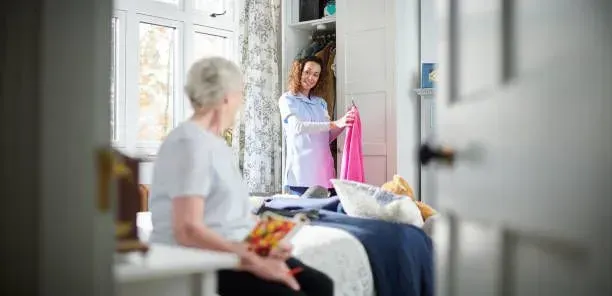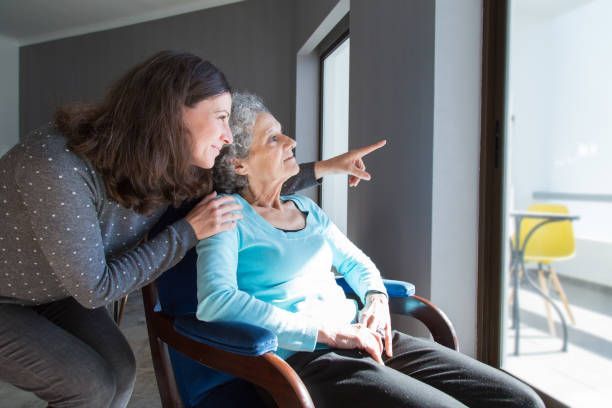A Guide to Understanding Hoarding Disorder in Older Adults
A Guide to Understanding
Hoarding Disorder in Older Adults
The involvement of family, friends, and neighbors is crucial in supporting elderly hoarders, as these trusted individuals can provide the emotional, physical, and social support necessary to address the condition effectively. For elderly hoarders, the sense of shame or fear of judgment often prevents them from seeking help, making the compassionate intervention of close acquaintances invaluable. Family and friends can offer non-judgmental communication and understanding, which helps build trust and encourages the elderly individual to open up about their struggles. Neighbors, being close in proximity, can keep a watchful eye on safety concerns and provide immediate assistance when needed. By working together, this supportive network can help alleviate the social isolation that often accompanies hoarding, assist in small, manageable decluttering efforts, and provide ongoing encouragement to ensure the elderly individual feels valued and understood, ultimately leading to a healthier and safer living environment.
7 Day Home Care is licensed by the New York State Department of Health to provide home care services in
Manhattan, Queens, Brooklyn, Nassau County, and Suffolk County, New York. To learn more about our home care services, please call 516-408-0034.

Effective Support and Intervention for Older Adults with Hoarding Disorder
Hoarding disorder is a complex mental health condition that can have significant effects on individuals, particularly older adults. Characterized by an overwhelming accumulation of items and difficulty discarding them, this disorder can impact quality of life, safety, and health. Understanding hoarding disorder in older adults is crucial for caregivers, family members, and healthcare professionals to provide effective support and intervention. This article discusses the intricacies of hoarding disorder, its implications for older adults, and offers practical solutions to manage and mitigate its effects.
What is Hoarding Disorder?
Hoarding disorder is a mental health condition marked by persistent difficulty in discarding or parting with possessions, regardless of their actual value. This behavior leads to excessive accumulation of items that clutter living spaces and can cause significant distress or impairment in daily functioning. In older adults, hoarding disorder may manifest differently compared to younger populations, often exacerbated by age-related factors such as loss, physical decline, and cognitive impairment.
Symptoms and Signs of Hoarding Disorder in Older Adults
Recognizing hoarding disorder in older adults involves understanding its symptoms and signs:
1. Excessive Accumulation: Older adults with hoarding disorder accumulate items in excessive quantities, often filling their living spaces to the point of unusability. This can include newspapers, clothing, and household items.
2. Difficulty Discarding Items: Individuals struggle to let go of possessions, even those that are clearly broken or outdated. This difficulty is often linked to emotional attachment or fear of future need.
3. Cluttered Living Spaces: The clutter resulting from hoarding can severely impact the functionality of living spaces, making it difficult to perform daily tasks or even navigate through rooms.
4. Emotional Distress: The disorder often causes significant emotional distress, anxiety, or depression. The clutter can become a source of shame and social isolation.
5. Safety Hazards: The accumulation of items can create safety hazards, such as fire risks, tripping hazards, or difficulties accessing emergency exits.
Hoarding Disorder Causes and Contributing Factors
Hoarding disorder is multifaceted, with various factors contributing to its development, particularly in older adults:
1. Genetics and Neurobiology: Research suggests a genetic component to hoarding disorder, with abnormalities in brain areas related to decision-making and emotional regulation.
2. Trauma and Loss: Significant life events, such as the loss of a loved one, trauma, or major life changes, can trigger or exacerbate hoarding behaviors.
3. Cognitive Decline: Cognitive impairments, including those associated with dementia, can affect decision-making and judgment, making it harder for older adults to manage possessions.
4. Cultural and Social Factors: Cultural attitudes toward possessions and personal history can influence hoarding behaviors. For instance, growing up during times of scarcity might lead to an increased tendency to accumulate items.
Impact of Hoarding Disorder on Older Adults
The effects of hoarding disorder on older adults can be profound:
1. Physical Health Risks: The clutter can lead to physical health issues, such as respiratory problems from accumulated dust or injuries from falls.
2. Mental Health Strain: The emotional burden of living in a cluttered environment can exacerbate mental health conditions like anxiety and depression.
3. Social Isolation: Hoarding can lead to social withdrawal, as individuals may feel embarrassed or ashamed about the state of their home. This isolation can further worsen mental health.
4. Impairment in Daily Functioning: The inability to manage personal space effectively can hinder daily activities and self-care routines.
5. Increased Risk of Fire and Safety Hazards: The clutter increases the risk of fire and other safety hazards, posing significant risks to the individual and their neighbors.
Solutions and Strategies for Managing Hoarding Disorder
Addressing hoarding disorder requires a multifaceted approach that includes practical interventions, psychological support, and social services. Here are effective strategies:
1. Professional Assessment and Intervention:
- Mental Health Evaluation: A comprehensive evaluation by a mental health professional is essential to diagnose hoarding disorder and identify any co-occurring conditions.
- Therapeutic Approaches: Cognitive-behavioral therapy (CBT) is a proven treatment for hoarding disorder. It helps individuals develop skills to manage their clutter and challenge their beliefs about possessions.
2. Practical Clutter Management:
- Organizing and Decluttering: Working with a professional organizer or a hoarding specialist can help in creating a plan for decluttering. This process should be gradual and sensitive to the individual's emotional needs.
- Setting Goals: Establishing clear, achievable goals for decluttering can help manage the process. Breaking tasks into smaller, manageable steps can make the process less overwhelming.
3. Health and Safety Considerations:
- Home Modifications: Implementing safety modifications in the home, such as installing grab bars and improving lighting, can help reduce the risk of injury.
- Regular Health Check-Ups: Regular health check-ups can address any physical health issues that might arise from living in a cluttered environment.
4. Support Systems:
- Family and Caregiver Involvement: Engaging family members and caregivers in the process can provide emotional support and practical assistance. They can help with organizing efforts and encourage adherence to treatment plans.
- Community Resources: Utilizing community resources, such as local support groups or social services, can offer additional support and reduce feelings of isolation.
5. Educational and Behavioral Interventions:
- Education: Educating individuals and their families about hoarding disorder can improve understanding and foster a supportive environment.
- Behavioral Techniques: Techniques such as exposure therapy can help individuals confront their fears related to discarding items and gradually reduce their hoarding behaviors.
Hoarding disorder in older adults is a serious condition that requires a compassionate and comprehensive approach. By understanding the symptoms, causes, and impacts of hoarding disorder, caregivers, family members, and healthcare professionals can better support affected individuals. Implementing practical strategies, seeking professional help, and fostering supportive environments can significantly improve the quality of life for older adults struggling with hoarding disorder. Addressing this issue with sensitivity and understanding is crucial in helping individuals lead healthier and more fulfilling lives. To learn more about our home care agency services, please contact us at 516-408-0034 today.
Brian Callahan
7 Day Home Care










